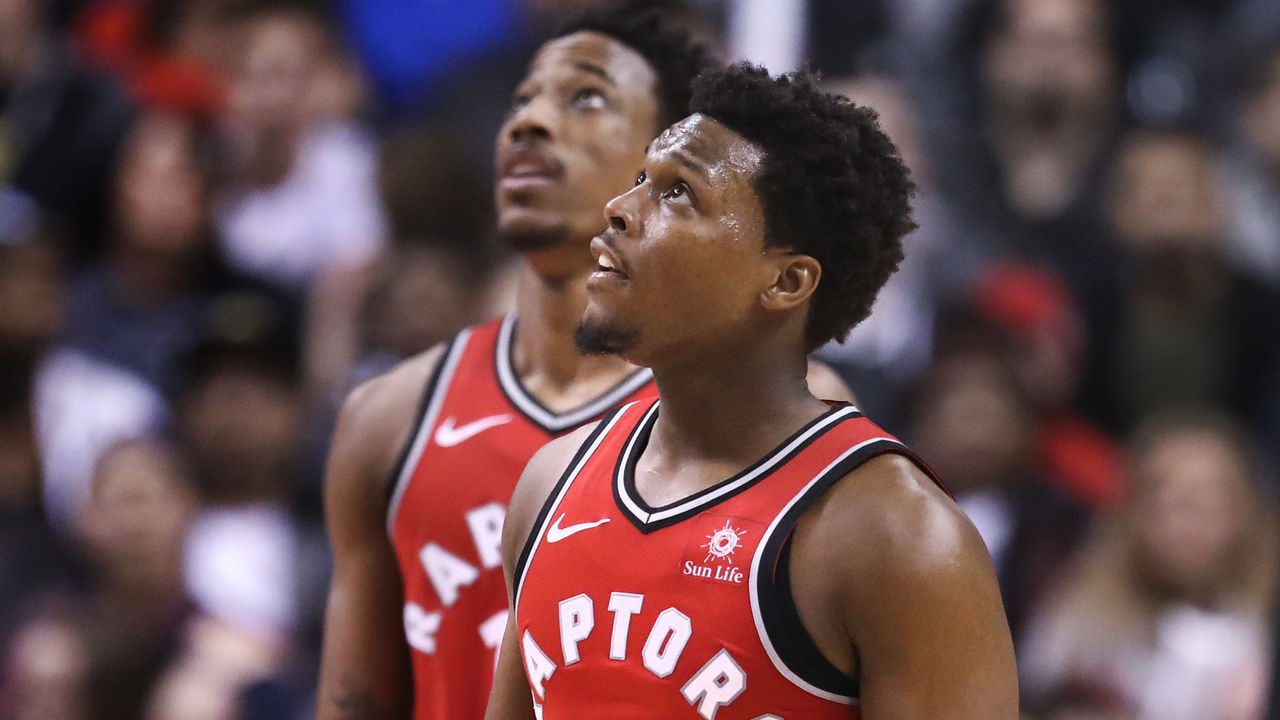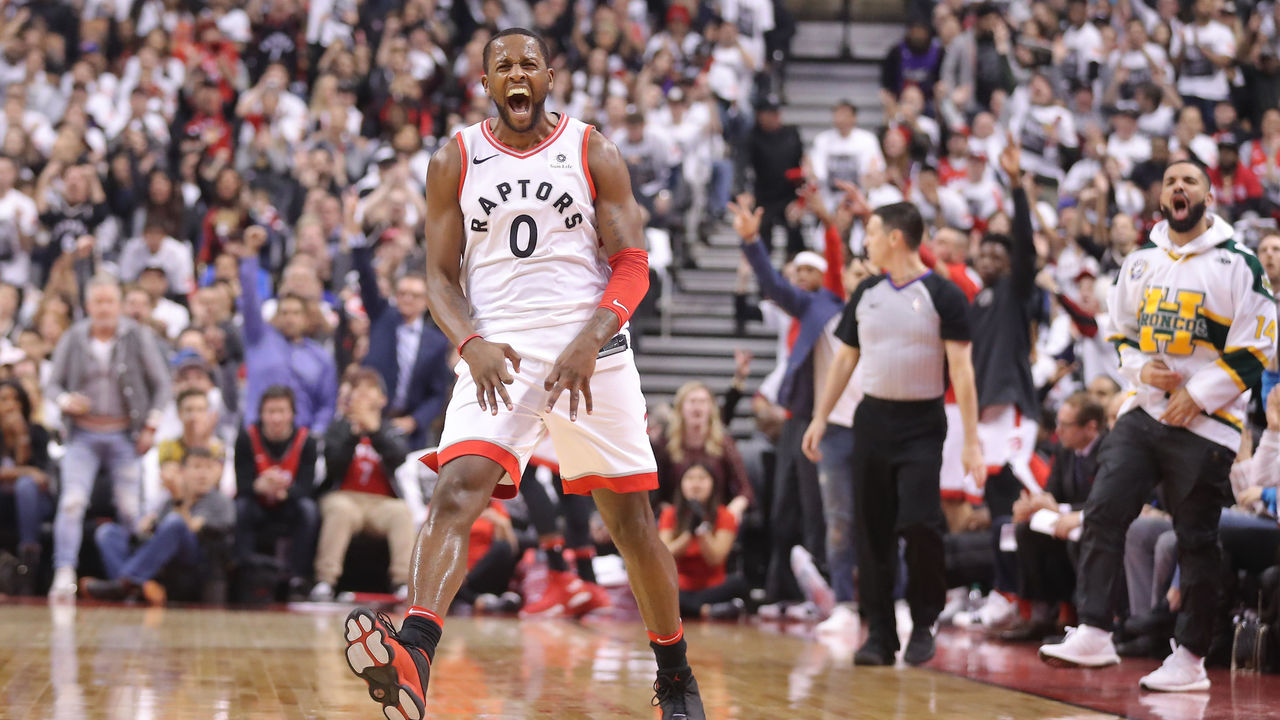Raptors' depth, supporting cast pass 1st playoff test
TORONTO -- It's a testament to Toronto's depth that on the night Serge Ibaka should have been basking in perhaps his finest performance as a Raptor - a 23-point, 12-rebound, two-block showing in a Game 1 win over the Washington Wizards - the Raptors' starting power forward was raving about the team's fifth big and 12th man.
"I think about Lucas (Nogueira). He's unbelievable, man," Ibaka said. Nogueira checked into a one-point game in the fourth quarter having logged more than seven minutes in a playoff game only once in his four-year career, then played nine of the final 10 minutes Saturday.
"I don't have words to say about (him). He doesn't play in five or 10 straight games, but when he's going to come on the court, he's ready."
Whether it was Nogueira's crunch-time rim protection, Delon Wright's two-way excellence, rookie OG Anunoby's versatile 3-and-D prowess - Anunoby guarded Washington's starting point guard, shooting guard, small forward, and power forward for at least one possession each - or C.J. Miles' shooting, the Raptors used the same balanced effort Saturday that they did from October through mid-April, when they racked up an Eastern Conference-leading 59 wins.
Common knowledge suggests that the value of depth shrinks come playoff time, when rotations tighten and top-end talent decides who survives and who heads home. That line of thinking confronted Raptors head coach Dwane Casey time and time again down the stretch of the regular season, as the potential Coach of the Year was peppered with questions about whether he could ride the same depth and all-bench lineups come the spring that he did through the fall and winter.
Casey often quipped that he had yet to find the rule book that said you couldn't play more than eight or nine guys in the postseason. For at least one night, the Raptors' supporting cast rewarded him; despite missing his best reserve in Fred VanVleet (who was nursing a shoulder injury), Casey used 11 players in Game 1.
"Guys played their role. It's the same role they played all year," Casey told theScore after a 114-106 Game 1 win. "We still hold the power to change our minds, but as long as those guys are producing, why should we change our rotation?"
Indeed, it was a unit featuring four reserves - including Nogueira - alongside Kyle Lowry that pulled away in the fourth quarter after the Wizards hung around (and then some) through the first three, thanks largely to the brilliance of John Wall.
"They have a lot of good players. Guys off the bench came in and stepped up," Wizards head coach Scott Brooks said in his postgame news conference. "VanVleet didn't play tonight but Wright came in and had a terrific game. That's why they're hard to guard. We have to do a better job of guarding all their players."

The Wizards' game plan is obvious, and it's the same formula a host of other postseason opponents have used to slow the Raptors' attack over the last four years: Send extra bodies and aggressive traps at Lowry and backcourt mate DeMar DeRozan, either forcing a low-percentage look for one of Toronto's All-Stars, or putting the ball in the hands of the team's less capable players.
That hasn't worked out so well for opposing defenses this season, however. Toronto's infamous culture reset has resulted in a more pass-happy, 3-point-heavy offense that remains sustainable when Lowry and DeRozan move the ball, which they're doing much more freely than ever before.
The All-Star duo combined for 15 assists - resulting in 36 points - in Game 1, and Raptors not named Lowry or DeRozan combined to shoot 13-of-21 on 3-point attempts.
"It's definitely a 'pick your poison' (situation), but we just have to do better," Brooks said of the challenges the Raptors' revamped offense provides.
"We have to be able to close out on point, close out on the catch, know who has the ball and which way to close out on them. Some guys can just flat-out shoot and they don't put the ball on the floor as well - we have to know that, understand that, and make sure they get away from their strengths."

No player fits that bill quite like Miles, a dead-eye shooter who scored 12 points on eight shooting possessions Saturday, going 4-of-7 from behind the arc.
"We have a lot of guys that can affect the game and are extremely talented and we've been able to use that to our advantage all year," Miles said of his team using an 11-man rotation in a playoff game. "If you've had to go to it and use it all year, there's no sense in us not taking advantage of it now."
Wright, meanwhile, praised Casey's season-long commitment to a deeper rotation.
"Coach did a good job of keeping us in the rotation all year," said Wright, who finished with 18 points, four assists, and three steals on 7-of-10 shooting in Game 1, with 11 of those points coming in the fourth quarter. "Whether we were playing 12 guys or not, everybody was in the rotation, so when people's moment came, we were just ready to step up."
To illustrate the impact of the Raptors' depth Saturday, consider DeRozan. The Raptors nursed a one-point lead to start the fourth quarter, with their go-to scorer - and arguably a top 10 talent this season - on the bench. When the four-time All-Star checked back into the game with 4:52 remaining, Toronto led by nine.
"It's great. We have the utmost confidence in our teammates, the way they've been playing all year," DeRozan told theScore. "The style of play we've been playing is trusting our teammates to make the next play, and you see it ... We invite the traps on us, honestly. We're going to make the right pass. It's about everybody else making the right play, and them guys did."
The Raptors have spent the best season in franchise history downplaying much of their success with the bigger picture in mind. They know it's only one game. And should they get by the Wizards, they'll likely hear the same questions about the value of their depth before running into the league's most dominant singular force in LeBron James. But if you're considering why this year might truly be different for Toronto, look no further than Saturday night, and the capability of that depth - empowered by Casey, Lowry, and DeRozan - to keep doing in April, May, and possibly even June exactly what it's been doing for the last six months.
(Photos courtesy: Getty Images)